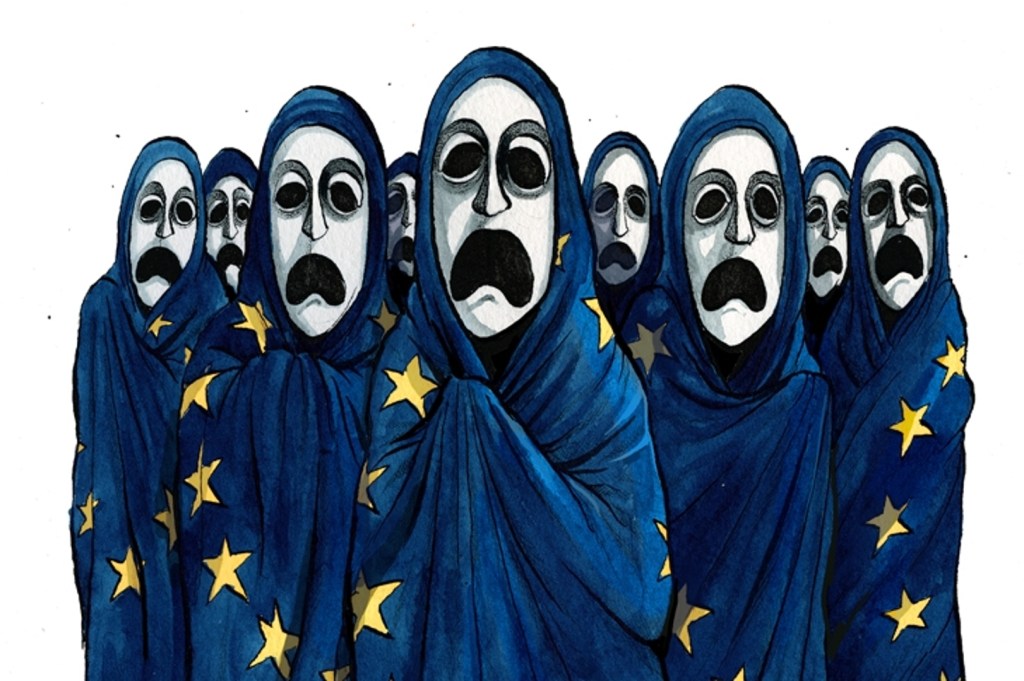The fourth round of official Brexit negotiations resumed on Tuesday, screen-to-screen. They will determine whether the stalemate can be broken and a trade deal sealed by the end of the transition date of December 31. By mid-June, a high-level ‘stock-take’ between Boris Johnson and Commission President Ursula von der Leyen will assess whether sufficient progress has been made to continue negotiations.
Such is not the case thus far, according to recent public utterances from Michel Barnier and David Frost, who has claimed ‘very little progress’. Just like in Endgame, Samuel Beckett’s tragicomedy, a sense of hopelessness pervades the final scene of the drama. In the play — as with Brexit — the characters await deliverance while nothing, in fact, happens. How will it all end? For sure, if the absurdity is to ‘finish’ this Endgame cycle, then any extension is out of the question. So three scenarios are possible, but only one is likely.
The first is the conclusion of a full Free Trade Agreement; the second is that talks break down and Britain moves to WTO rules from January 1, 2021; the third sees talks become ever more fractious and the EU’s kingmakers — France and Germany — step in to redirect the official negotiations.
Of the three, the second seems the most probable — but not before Macron and Merkel make an entrance.
What will they press for? A wide gap exists on EU access to UK fishing waters and the requirement for Britain to provide a level playing field on regulations, security and governance. Nothing happens once, as during Theresa May’s premiership, it will be the Merkel-Macron ‘good cop, bad cop’ dynamic. Merkel will be practical, calm and seemingly helpful in proffering compromises. Macron will be ideological, imperious and inflexible. But the context has changed dramatically since the days when Mrs May’s UK could be browbeaten by the Franco-German duo. The UK government is in a much stronger position domestically, while the EU is weaker and more divided than it has been since the 2008 great financial crash. There are several reasons for this.
First, the EU put on a hapless display of division during the early period of the coronavirus pandemic, with France and Germany blocking the export of masks and ventilators to the likes of Italy. Despite belated apologies from the President of the European Commission, the wound has not healed.
Second, in attempting to construct a financial rescue package for the pandemic, the European member states have split between north and south. The Franco-German rescue plan of €750 billion ($840 billion) worth of loan and debt mutualization remains to be agreed by the 27 leaders, their governments and, crucially, their parliaments. That is a tall order.
Hostility to the package by the ‘frugal four’ of Holland, Austria, Denmark, Sweden, is public knowledge. But other member-states are joining them to the anguish of the Commission. They have realized that the richest member states will receive substantial payouts from the fund — France €39 billion ($43.7 billion) — and that the European Commission will be in charge of recouping the debt via EU taxes and overseeing member state expenditure, as Matthew Lynn pointed out last month. Fractured European solidarity on EU issues makes speaking to the UK with one voice difficult.
Third, the German Federal Constitutional Court’s ruling of May 5 has undermined two fundamental EU principles: the primacy of European over domestic law and the supremacy of the European Court of Justice. In so doing, it has theoretically boosted member states’ sovereignty. Other national jurisdictions may seek to follow the German example in contesting the legitimacy of unpopular EU actions, sowing further discord among member states. It also makes a mockery of the EU’s insistence on the ECJ’s supremacy of jurisdiction over UK domestic law, a fortiori post-Brexit.
[special_offer]
Fourth, EU solidarity won the day in extracting the withdrawal agreement and political declaration from the UK. But now cracks are emerging in the final throes of trade negotiations where member states’ conflicting national interests are visible. For instance, central and eastern European states, by their geography, contest their western counterparts dogged insistence on retaining, at all costs, fishing rights in UK waters – an east-west fracture added to that of north-south.
Since the nadir of the May days, the boot has been on the other foot as regards negotiating solidarity. Expect particularly jaundiced member states — the Scandinavians and the eastern Europeans — to contest the Commission and Macron’s euro-ideological hard line. The UK has the opportunity to drive a hard bargain by using discontented member-states — with whom it has in the last few years increased its diplomatic presence — to divide and conquer, in the manner of the European Commission towards the constituent nations of the United Kingdom.
In truth, the two sides are too far apart for a deal to be feasible. World Trade Organization rules with annex agreements in an ‘Australian deal’ is the sanest outcome. Otherwise, as with Endgame’s character Clov — who constantly vows he is leaving, but cannot exit the room — the Brexit play will join the theater of the absurd.
This article was originally published onThe Spectator’s UK website.

























